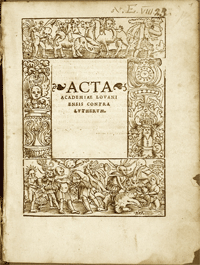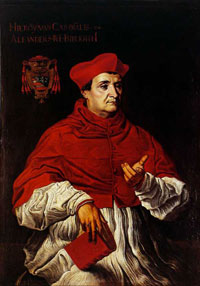



Girolamo Aleandro
Motta di Livenza 1480 - Roma 1542
Girolamo Aleandro, Italian cardinal, was born at Motta, near Venice, on the 13th of February 1480. He studied at Venice, where he became acquainted with Erasmus and Aldus Manutius, and at an early age was reputed one of the most learned men of the time. In 1508 he went to Paris on the invitation of Louis XII as professor of belles lettres, and held for a time the position of rector in the university. Entering the service of Eberhard, prince-bishop of Liege, he was sent by that prelate on a mission to Rome, where Pope Leo X retained him, giving him (1519) the office of librarian of the Vatican. In the following year he went to Germany to be present as papal nuncio at the coronation of Charles V, and was also present at the diet of Worms, where he headed the opposition to Luther, advocating the most extreme measures to repress the doctrines of the reformer. His conduct evoked the fiercest denunciations of Luther, but it also displeased more moderate men and especially Erasmus. The edict against the reformer, which was finally adopted by the emperor and the diet, was drawn up and proposed by Aleandro. After the close of the diet the papal nuncio went to the Netherlands; where he kindled the flames of persecution, two monks of Antwerp, the first martyrs of the Reformation, being burnt in Brussels at his instigation. In 1523 Clement VII, having appointed him archbishop of Brindisi and Oria, sent him as nuncio to the court of Francis I. He was taken prisoner along with that monarch at the battle of Pavia (1525), and was released only on payment of a heavy ransom. He was subsequently employed on various papal missions, especially to Germany, but was unsuccessful in preventing the German princes from making a truce with the reformers, or in checking to any extent the progress of the new doctrines. He was created cardinal in 1536 by Paul III and died at Rome on the 1st of February 1542. Aleandro compiled a Lexicon Graeco-Latinum (Paris, 1512). The Vatican library contains a volume of manuscript letters and other documents written by him in connexion with his various missions against Luther.
(1911 Encyclopedia Britannica)
Main works: Lexicon Græco-latinum (Parisiis 1521); Grammatica Græca (Argentorati 1517).
Bibliography: P. Kalkoff, Die Depeschen des Nuntius Aleander: vom Wormser Reichstage 1521, Halle 1886 (2ª ed. 1897); J. Paquier, Jerome Aleandre: de sa naissance a la fin de son sejour a Brindes (1480-1529), Paris 1900 (reprints Genève 1977); E. Jovy, Francois Tissard et Jerome Aleandre: contribution a l'histoire des origenes des etudes grecques en France, Vitry-le-Francois 1899-1913 (reprints Genève 1971); I. Bywater, The Erasmian pronunciation of Greek and its precursors: Jerome Aleander, Aldus Manutius, Antonio of Lebrixa, London 1908; P. Kalkoff, Aleander gegen Luther: studien zu ungedruckten aktenstucken aus Aleanders nachlass, Leipzig-New York 1908; F. Saponaro, Il cardinale Girolamo Aleandro: contributo del cardinale brindisino nella lotta al protestantesimo e preparazione del Concilio di Trento alla riforma della Chiesa e difesa del papato, Padova-Napoli 1954; G. Alberigo, Aleandro, Girolamo, in Dizionario biografico degli Italiani, vol. 2 (1960); F. Gaeta, Un nunzio pontificio a Venezia nel Cinquecento: Girolamo Aleandro, Venezia-Roma 1960; J. Hoyoux, Le carnet de voyage de Jerome Aleandre en France et a Liege (1510-1516), Bruxelles-Rome 1969; Correspondance de Peiresc et Aleandro, editée et commentée par J.-Fr. Lhote et D. Joyal, Clermont-Ferrand 1995.